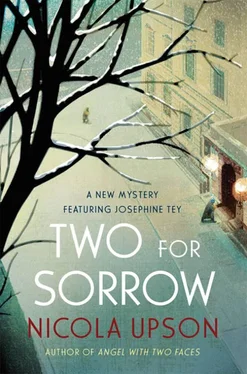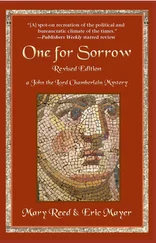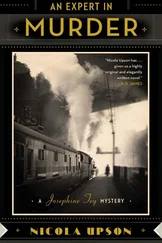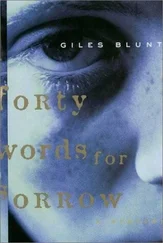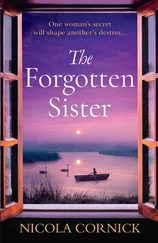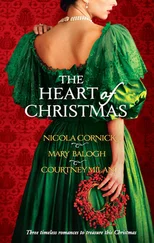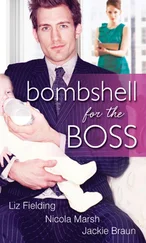Nicola Upson - Two for Sorrow
Здесь есть возможность читать онлайн «Nicola Upson - Two for Sorrow» весь текст электронной книги совершенно бесплатно (целиком полную версию без сокращений). В некоторых случаях можно слушать аудио, скачать через торрент в формате fb2 и присутствует краткое содержание. Жанр: Старинная литература, на английском языке. Описание произведения, (предисловие) а так же отзывы посетителей доступны на портале библиотеки ЛибКат.
- Название:Two for Sorrow
- Автор:
- Жанр:
- Год:неизвестен
- ISBN:нет данных
- Рейтинг книги:4 / 5. Голосов: 1
-
Избранное:Добавить в избранное
- Отзывы:
-
Ваша оценка:
- 80
- 1
- 2
- 3
- 4
- 5
Two for Sorrow: краткое содержание, описание и аннотация
Предлагаем к чтению аннотацию, описание, краткое содержание или предисловие (зависит от того, что написал сам автор книги «Two for Sorrow»). Если вы не нашли необходимую информацию о книге — напишите в комментариях, мы постараемся отыскать её.
, the spellbinding follow-up to
and
. Fans of P.D. James, Agatha Christie, and Jacqueline Winspear will relish this ingenious literary creation, as one of the most beloved mystery writers of the twentieth century, while doing research for a new novel based on a horrific case of multiple child murder in 1903 London, is drawn into a chillingly related hunt for a sadistic, present-day killer.
Two for Sorrow — читать онлайн бесплатно полную книгу (весь текст) целиком
Ниже представлен текст книги, разбитый по страницам. Система сохранения места последней прочитанной страницы, позволяет с удобством читать онлайн бесплатно книгу «Two for Sorrow», без необходимости каждый раз заново искать на чём Вы остановились. Поставьте закладку, и сможете в любой момент перейти на страницу, на которой закончили чтение.
Интервал:
Закладка:
‘But in a respectable street like this, you wouldn’t expect to see anything out of the ordinary. That’s what was clever about it.’
Josephine nodded. ‘And I suppose all there was to see was exactly what you’d expect from a nursing home. Listen—why don’t you leave me here for a bit and do what you need to do? I’d like to walk up and down the street and try to get a feel for what it was like back then.’
Fallowfield looked doubtful. ‘Are you sure you’ll be all right on your own?’
‘Of course I will. As you said—it’s the height of respectability. Come back and fetch me when you’re ready.’
‘All right, but I’ll be half an hour at the most.’
She watched him turn the car round and force his way back into the busy traffic on the High Street, then crossed over to get as close a look at Claymore House as she could manage without drawing attention to herself. The terrace was late Victorian and must have been almost brand new when the Sach family took it. Where had the money come from? she wondered. Was it Amelia’s growing business that had made the move possible, or did the family have other means, either through her husband’s earnings or some sort of private income? She looked long and hard at the house, which was an enviable residence even by today’s standards. Having read widely about the times, she was mindful of the conditions that drove women to kill, but this wasn’t poverty—this was climbing your way up the social scale in a calculated manner, and she was even more convinced that Sach’s guilt was the greater of the two, bloodless as it was. Sach had trained as a nurse and midwife—why was an honest living not enough for her? Josephine thought about all the hard-working young nurses she nodded to each day at the Cowdray Club, and all the dedication she had witnessed in her own life; admittedly, great advances had been made in the status of nurses as professionals over the last thirty years but they were still very poorly rewarded in comparison with other working women—materially, at least. Yet how many of them would countenance putting their training to illicit ends purely for money, taking advantage of vulnerable people who had no choice but to depend on them? She could think of no profession which was easier to abuse, and no line that would be harder to cross.
Peering through a gap in the terrace, Josephine could just about see to the rear of the houses, and tried to imagine what Sach had thought as she watched her daughter playing in one of those yards. Could she really have believed that she was building a secure future for Lizzie? Or—and this was a terrible thing to think—was her own child merely a smokescreen for her crimes, the perfect alibi in a world where, as Fallowfield said, women bore children but did not kill them? She walked to the other end of the road so as not to appear too ghoulish, then took out her notebook and jotted down her first impressions of the house and neighbourhood, mentally revising the few details that had already been sketched out in the draft she had written the night before. As she was doing so, a man came out from the house opposite and looked at her curiously. ‘Taking an interest in Hertford Road?’ he asked, smiling at her. ‘You must be after the child killers. A journalist, perhaps?’
‘No, nothing quite that sensational,’ she said, then added vaguely: ‘I’m just doing a bit of research for a book.’ He looked interested, but was too polite to question her further. ‘I don’t suppose you were here at the time?’ she asked hopefully.
He shook his head. ‘No, sorry. My wife and I moved in just after the war and I don’t know anyone who’s been here longer. But we’ve all heard about the woman who ran the nursing home and killed babies.’ Josephine didn’t put him right, but she was interested to see how stories were corrupted in the telling: Sach would be mortified to know that, after all her careful work to distance herself from the actual bloodshed, history had her down as the murderer. The man shuddered. ‘It doesn’t bear thinking about, does it?’ he said, walking on.
By the time she had finished making notes, her chauffeur was back in place at the end of the street and she walked over to meet him. ‘Have you seen all you need to?’ he called through the window, and Josephine nodded. ‘Then how about a quick trip over to Islington to see Walters’s lodgings? If we go straight there, it’ll still be daylight.’
‘Have you honestly got time to take me all the way to Islington? I know how busy you are—Archie said things were frantic at the moment.’
‘It’s amazing how long you can wait to talk to a witness, you know, and the traffic in Finchley can be shocking at this time of the day.’ He winked at her. ‘Anyway, what Inspector Penrose doesn’t know can’t hurt him.’
She got in, and the aroma of bacon rose up from a parcel on the dashboard. ‘It’s way past lunchtime and I thought you might be hungry,’ he said. ‘There’s a good cafe round the corner, but if we stop there we won’t get to Danbury Street before dark.’
Touched, she unwrapped the greaseproof paper. ‘I said lunch was on me, Bill. You’re doing me enough favours as it is.’
‘It’s a pleasure, Miss. Your treat next time.’
They set out again, driving back the way they had come for a while, then striking off to the left. As the sergeant negotiated a network of smaller streets off the Caledonian Road, Josephine admired the unhesitating way in which he chose his route; not a Londoner by birth, Fallowfield nevertheless belonged to the city in the way that incomers often do, held there by a bond which was all the stronger for its element of choice. It was hard to imagine him as the new boy which he must have been during the time of Sach and Walters. ‘Do you remember much about the case?’ she asked, finishing her sandwich and, as directed, dropping the bag by her feet, where it joined the remnants of a week’s worth of lunches eaten on the move.
‘Not really, I’m afraid,’ Fallowfield said. ‘To be honest, you’re so busy during those early years trying to keep on top of the cases you are involved with that there’s precious little time to take an interest in those that don’t really concern you. I’d heard about it, obviously, and there was a lot of talk about it at the Yard because Walters lodged with a couple of coppers, but the trial was all done and dusted by the time I had anything to do with it. Delivering the Billingtons was as close as I got to it.’
‘I was astonished when I found out where Walters lived,’ Josephine said. ‘Why on earth would she take a room in a house with two policemen?’
‘Well, she wasn’t too bright, by all accounts.’
‘She certainly wasn’t well educated if any of her statements are to be trusted, but I’m not so sure about bright. I wonder if that was just a card she played—wanting to be thought more stupid than she really was.’
‘Perhaps it was a sort of double bluff, then—the most brazen thing she could think of. Killing children under a copper’s nose is almost too ridiculous to be true.’
‘If so, then it backfired.’ He looked questioningly at her. ‘They got suspicious about the babies she brought home with her—although God knows why she took them there at all—and had her followed. She was caught red-handed with a dead child. I wonder if she’d ever have been rumbled if she’d chosen to live somewhere else?’
‘What other evidence was there?’
‘Well, there was one witness who said she’d seen Walters in a cocoa-house in Whitechapel a day or two before, holding a baby wrapped in a blanket. She was suspicious because the child didn’t move or make any sound at all, but Walters came out with some nonsense about its being under anaesthetic. Then there was another woman—Evans, I think her name was.’ Josephine rummaged in her bag for her notebook and turned back a few pages, holding the words at arm’s length so that she could read them without glasses. ‘No, sorry—Nora Edwards. It seems to me that she hanged them both, really. She’d answered Sach’s advertisement in the newspaper and had gone to the nursing home to have her child. Sach tried to get her to give the baby up, apparently, but she refused because she wanted to keep it. She stayed on at the home, though, and started to work for Sach as a servant. At the trial, she testified that Walters took babies away from Sach’s premises on a regular basis, and that she was told never to tell the mothers where they went, or with whom.’ She put the notebook back in her bag and thought for a moment. ‘You know, when I read the trial reports, that was the part I really couldn’t understand. Edwards must have known what was going on—I’m even more convinced of that now I’ve seen the sort of premises that Sach used—so why did she stay? How could she do that, knowing that her own child had so nearly met the same fate? At best, she was enabling it to happen by turning a blind eye—at worst, I wonder if she had more to do with it than was ever suggested. Perhaps she turned evidence against Sach and Walters to save her own skin.’
Читать дальшеИнтервал:
Закладка:
Похожие книги на «Two for Sorrow»
Представляем Вашему вниманию похожие книги на «Two for Sorrow» списком для выбора. Мы отобрали схожую по названию и смыслу литературу в надежде предоставить читателям больше вариантов отыскать новые, интересные, ещё непрочитанные произведения.
Обсуждение, отзывы о книге «Two for Sorrow» и просто собственные мнения читателей. Оставьте ваши комментарии, напишите, что Вы думаете о произведении, его смысле или главных героях. Укажите что конкретно понравилось, а что нет, и почему Вы так считаете.
